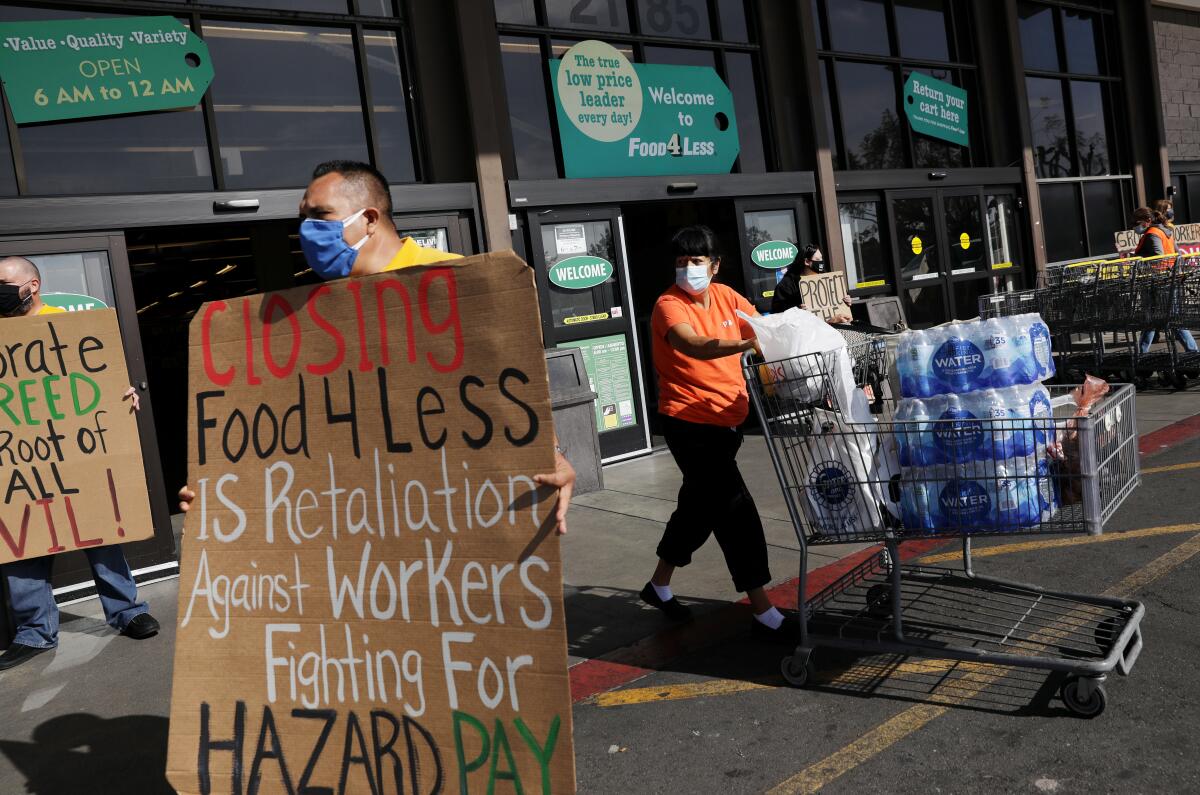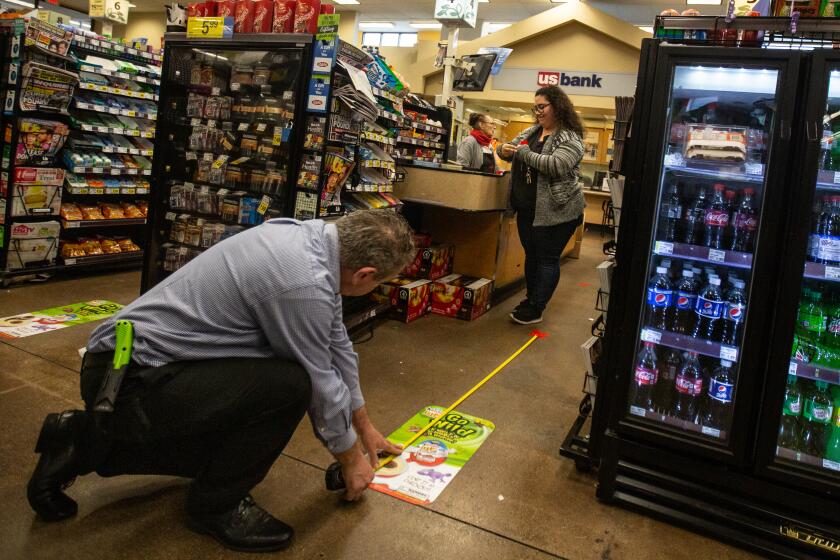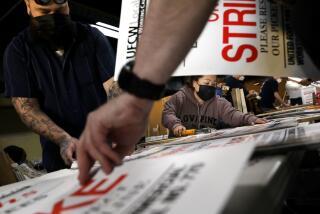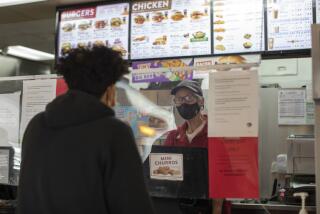‘An untenable work environment’: Grocery workers brace for Omicron surge

- Share via
After taking several months off following a bout with COVID-19, Rachel Campos went back to work as a grocery store cashier in July with more knowledge about how to minimize the risk of contracting the disease on the job, and hopes of feeling safer.
This week, a co-worker Campos had been in close contact with at her Ralphs location tested positive for the virus, and she has heard of several other infections among the staff, upending any sense of control or safety as the Omicron variant of the coronavirus sweeps through California with staggering speed.
“I felt that it would be different — more measures to make sure we were OK. And there’s not,” said Campos, who finds herself anxious and paranoid at work once again.
Workers are struggling through another winter holiday season with a COVID-19 surge, this one with a variant spreading faster than any before it. The week leading up to Christmas is usually a busy one for grocery stores, and this year, food retailers are expecting record-breaking sales.
For workers, that is not translating into more or better protections at work, several employees said in interviews. And although the pandemic has made more people aware of pressures retail workers face, not all customers are kind.
“I just got called a ‘Nazi pedophile’ for telling someone to put on a mask,” said Kathleen Scott, who works at an Albertsons grocery store in Los Feliz.
Scott said her employer has not issued new guidance amid the rise in Omicron infections. Working through the pandemic has worn her and many of her co-workers down, she said, and the temporary $5-an-hour hazard pay boost mandated by the city has expired. Scott feels they receive little support from their employer. She likened the experience to running a marathon.
“When you get to the last three miles, you push yourself harder because you think it will be over soon,” Scott said. “We keep feeling like we got to that last mile, and then there’s another mile, and at some point you just collapse.”
Albertsons did not immediately respond to a request for comment.
The L.A. City Council has ordered staff to draft an ordinance requiring big grocery and pharmacy chains to pay workers an extra $5 an hour for 4 months.
Kroger spokeswoman Vanessa E. Rosales said that the company has taken a number of precautions, including implementing several workplace safety policies at the onset of the pandemic and making the administration of vaccines to workers a primary focus. Associates who get the required number of doses are eligible to receive a one-time payment of $100, she said.
“We have been navigating the COVID-19 pandemic for almost two years and, in line with our values, the safety of our associates and customers has remained our top priority,” Rosales said in an emailed statement. “We also continue to comply with all government regulations and are carefully reviewing the various components of the requirements and learning from government agencies and other experts to determine our approach.”
Grocers are facing a double hit, said Burt P. Flickinger III, managing director of the retail consultant Strategic Resource Group. They are short-staffed with employees out with COVID-19, and in some cases because other retailers are enticing away their workers with signing bonuses and other perks.
Unionized employers such as Kroger, which owns Ralphs, tend to have higher levels of worker retention because of their better benefits, Flickinger said. “Workers at these unionized grocers tend to be productive and loyal, whereas there’s far more turnover in restaurants, particularly in fast food,” Flickinger said.
Dana Spencer quit her job at the Whole Foods in Laguna Nigel, where she worked for seven years, just after Easter. “It was getting to be an untenable work environment,” she said in an e-mail.
Now, when Spencer shops at the store, she hears that it’s short-staffed. Sometimes customers wait 15 to 30 minutes in line to buy a few items, Spencer said.
Spencer wasn’t the only one who decided to leave the store. Nearly everyone in the department she worked in has quit Whole Foods since she left. A few went on to work at Trader Joe’s, she said.
“No one I worked with is happy, and everyone I speak to is looking for other employment,” Spencer said. “This is hard, underpaid, and underappreciated work.”
On Wednesday morning, a supervisor notified Campos that the co-worker Campos had been in close contact with had tested positive. Campos said she did not receive instructions to quarantine or any further guidance.
Campos worked for hours feeling paranoid, wondering if she was starting to feel sick. When she got a headache, she decided she’d had enough and left her shift early, clocking out around 5 p.m. instead of her scheduled 9:30 p.m. end time. A headache was the same initial symptom Campos had when she got COVID a year ago.
She is not scheduled to work for the next two days. She plans to take tests and monitor her symptoms.
More to Read
Inside the business of entertainment
The Wide Shot brings you news, analysis and insights on everything from streaming wars to production — and what it all means for the future.
You may occasionally receive promotional content from the Los Angeles Times.












